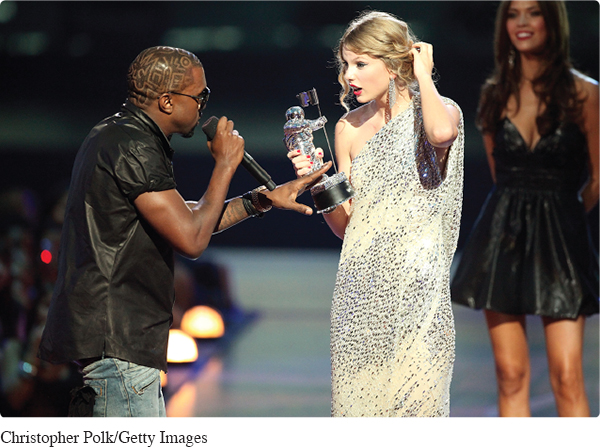8.3 Selecting an Approach to Conflict
When conflict erupts, you make choices about how to deal with it. You may avoid the issue, accommodate the wishes of others, compete to get what you want, or collaborate to solve the problem. All of these choices have consequences—determining whether the conflict endures, escalates, or is resolved, and whether your relationship with the person involved is damaged, destroyed, or preserved.
“And the Moonman goes to . . . Taylor Swift!”1 At the now infamous 2009 MTV Video Music Awards (VMA), 19-year-old Taylor Swift, still new to the pop music scene, beat out pop superstar Beyoncé for “Best Female Video.” As Swift took the stage to begin her acceptance speech, Kanye West sat in the audience stewing, believing that Beyoncé, not Swift, should have won. Rather than avoiding the issue, or commenting on it quietly to his entourage, he got up and stormed the stage. Grabbing the microphone from a stunned Swift, West shouted, “Gonna tell ya, I’m really happy for you, I’m gonna let you finish, but Beyoncé had one of the best videos of all time, one of the best videos of all time!” He then handed the mike back to Swift, who stood there in shock for 30 seconds, silently holding her award. Audience members booed West, who made an obscene gesture at them off camera.
Within hours, the incident was the top-trending topic on Twitter. Industry insiders spoke out publicly against him, and even then president Obama chimed in on the criticism, calling West a “jackass” for his misbehavior. Although West blogged an apology (“I’m sooooo sorry to Taylor Swift and her fans and her mom”), he received so much flak that he ended up taking several months off from recording and performing. Eventually, however, the conflict resolved as publicly as it had begun, when Swift presented West with the Video Vanguard Award at the 2015 VMAs.
Page 195
Not all conflicts are kept between those who are directly a part of them. Sometimes, as in the case of Taylor Swift and Kanye West, many people are able to bear witness to the event as it develops. How do you deal with conflict when others are watching? Is it different from the way you react when you are in a more private setting?

Christopher Polk/Getty Images
Few (if any) of us will have to deal with a conflict in front of millions of television viewers. But when you do experience disagreements, the same conflict process unfolds as the one between West and Swift. First, choices are made regarding how to manage the conflict. Second, outcomes follow from these choices. In this section, we discuss four common approaches to conflict—avoidance, accommodation, competition, and collaboration—and their outcomes.
